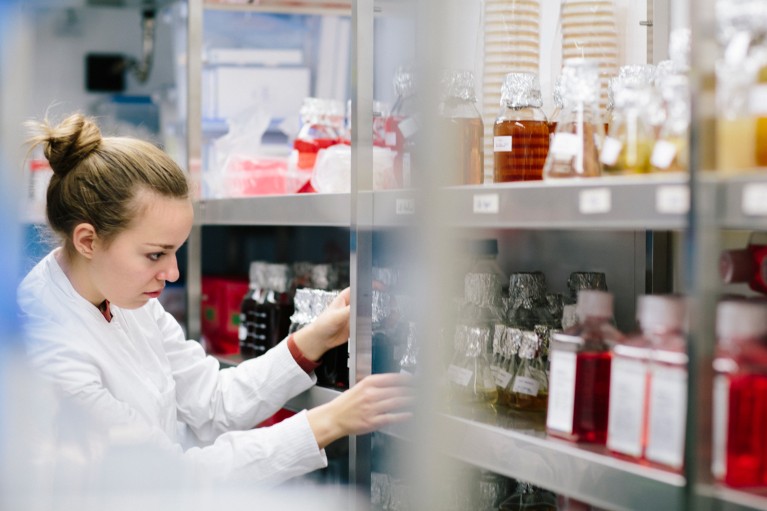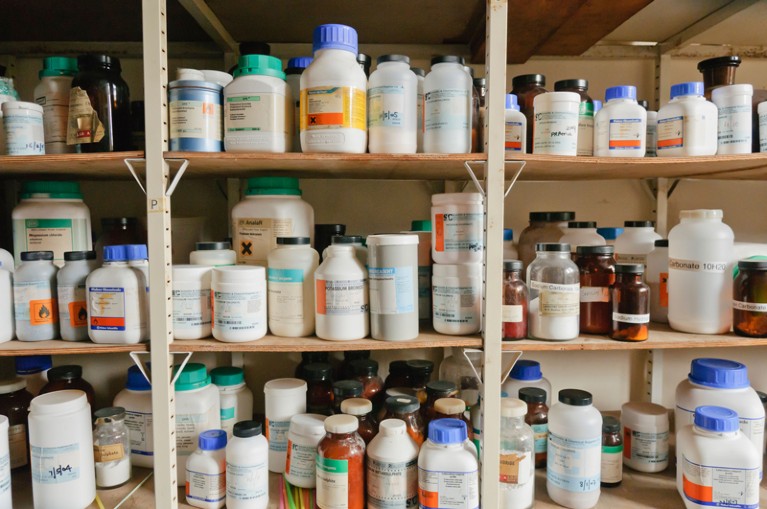
Even when their best-before dates have handed, some supplies can nonetheless be used — and doing so is usually a cost-conscious alternative.Credit score: Getty
Everybody has at one time or one other grabbed one thing out of the fridge or retailer cabinet, solely to seek out that its use-by date is gone. It nonetheless seems to be good, and it smells OK. Must you throw it out? For many of us, the merchandise in query could be milk, eggs or cereal. For Giorgio Cattoretti, it was antibodies.
Cattoretti has travelled the world together with his antibodies. He began amassing them within the early Nineteen Nineties on the Nationwide Most cancers Institute of Milan in Italy for his research in immunology and oncology, and introduced them with him when he moved to america in 1994. “They stayed within the fridge for 13 years within the US, after which I shipped them again to Italy,” says Cattoretti, a now-retired pathologist whose most up-to-date appointment was on the College of Milano-Bicocca in Italy. “They usually stored working.”
Cattoretti held on to these antibodies for each sentimental and sensible causes: some had been distinctive clones that had been now not obtainable, others had been just too pricey to interchange. However, in keeping with their best-before dates, many had been expired for greater than a decade.
Whether or not a reagent continues to be usable after its expiration date is a query that researchers typically ask. Social-media web sites, akin to Reddit and ResearchGate, are stuffed with discussions sparked by posts akin to: “How severely do you are taking chemical expiry dates?” and “Do PCR reagents actually expire?”
The reply is: generally. Sure reagents will nonetheless work simply high-quality, so utilizing them could be each financially savvy and environmentally pleasant. However scientists should depend on instinct, expertise and the appropriate assessments to be sure that outdated supplies are working correctly.
Unexpectedly lengthy life
The laboratory through which Sofia Kinton earned her doctorate at Northeastern College in Boston, Massachusetts, had a big assortment of restriction enzymes — proteins used to cleave DNA at particular websites — lots of which had been outdated and rarely used. “My [principal investigator] was a basic hoarder,” Kinton jokes. “He by no means threw something out.”
In the future, a pupil from a neighbouring lab requested to borrow one. “We found that the enzyme was from the Nineteen Nineties, making it one yr older than she was,” says Kinton, who’s now a analysis scientist on the pharmaceutical firm Sanofi in Boston. The enzyme had been expired for many years. “She tried it anyway, and it nonetheless labored.”
A handful of research have explored reagent longevity. A few decade in the past, for instance, Cattoretti and his colleagues put among the oldest antibodies of their lab fridges to the check1. They assessed three dozen antibodies that had been 12–26 years previous their expiration date and located that 34 nonetheless labored accurately in immunohistochemistry experiments, through which antibodies are used to spotlight particular markers in skinny slices of tissue. Different newer research have equally discovered that antibodies can be utilized lengthy past the producers’ best-before dates — some as many as 21 years later2.
For Stephen Bustin, a molecular biologist at Anglia Ruskin College in Cambridge, UK, an analogous examine of PCR grasp mixes, that are premixed blends of reagents used to amplify nucleic acids, was motivated by the funding drought that UK researchers skilled within the wake of the nation’s exit from the European Union in 2020. Bustin and his staff got here to 2 conclusions: the grasp mixes labored lengthy after their expiry date — greater than seven years, in a single case — they usually may very well be used at decrease concentrations than advisable, to stretch the provision3.

Some reagents nonetheless work effectively for many years after they’ve expired.Credit score: Stephen Barnes/Science/Alamy
Teachers typically determine to maintain — and use — expired reagents for each monetary and sensible causes, Bustin says. For example, as a result of many researchers purchase supplies in bulk close to the top of the fiscal yr to spend the rest of their lab budgets, many reagents sit for lengthy durations earlier than they’re used up. “I’m utilizing grasp mixes which are from round 2007,” he says.
Fabian Listing, who in 2023 accomplished his PhD in entomology at Texas A&M College in School Station, says that he used a PCR grasp combine that had expired 5 years earlier to finish his dissertation analysis. “In my expertise, it was fairly frequent to make use of expired reagents,” says Listing, who now works on the pest-control firm APC in Hamburg, Germany. If supplies are saved accurately — that’s, in keeping with the producer’s suggestions — and stay undisturbed, “they usually final for much longer than you’ll count on”, he provides.
Setting a date
To determine a product’s best-before date, producers usually carry out a battery of assessments. This consists of inserting the fabric beneath numerous circumstances — totally different temperatures, for instance — and assessing how its bodily parameters, akin to pH and conductivity, and efficiency in a typical experiment change over time, explains Markus Spregner-Haussels, vice-president of product improvement at Qiagen, a scientific-reagent producer with headquarters in Venlo, the Netherlands. Firms additionally typically stress-test their merchandise — for example, beneath very excessive temperatures — to find out their shelf life.
Different strategies, akin to inspecting historic knowledge and ongoing monitoring of reagent efficiency, are used, too, says Lívia Guadaim, a communications enterprise associate for international science and lab options at Merck, a life-sciences reagent producer headquartered in Rahway, New Jersey.
If a reagent is expired, that doesn’t essentially imply that it’ll cease working instantly, however its efficiency will often decline over time, Spregner-Haussels says. “With the shelf life we point out on our merchandise, we’re guaranteeing that they’re good, even in worst-case situations, so long as you employ the product as described,” he says. “If individuals use them longer than this, then it’s an off-label use and we merely can’t assure the efficiency.”
Storage circumstances akin to temperature, humidity and lightweight publicity can have an effect on reagent lifespan. Sure chemical substances, akin to salts, can final nearly indefinitely if saved correctly, says Mikael Kubista, a biochemist on the Institute of Biotechnology of the Czech Academy of Sciences in Vestec. “After I was a trainee, we had chemical substances that had been ordered 20, 30 years earlier by earlier professors, they usually had been typically working high-quality.”
The character of the examine also can decide how environment friendly a reagent must be. If a scientist is just isolating genomic DNA from blood, a excessive PCR yield may not be essential — so a lower-performing reagent may suffice. Nevertheless, if a researcher is attempting to nail down the offender behind a uncommon an infection, with just a few copies of viral DNA current within the pattern, it’s far more vital to make use of reagents at peak efficiency.
Kinton says that the case of the scholar borrowing an expired enzyme was instance of when to make use of such a reagent — testing the enzyme’s validity took solely an hour or two, and the examine had low stakes. “There’s actually not a draw back to trying it,” Kinton says. “If it’s a state of affairs the place it’s a extra valuable pattern or there’s a extra pressing want, we could be extra cautious.”
To make use of or to not use?
To increase a the lifespan of a reagent, researchers ought to think about not solely storage elements akin to gentle, temperature and humidity, but additionally preparation strategies. Buffers, for example, can affect the steadiness of PCR primers and probes, Kubista says. It’s additionally vital to keep away from freezing and thawing reagents a number of instances, he provides. “Usually, we freeze them in aliquots, so we solely need to thaw them as soon as, as a result of freeze–thawing degrades materials.”
Additionally think about the containers through which supplies are saved. Some reagents are available in plastic containers that may turn into brittle if dealt with occasionally, says Ann Ehrenhofer-Murray, a molecular biologist on the Humboldt College of Berlin, who, like Cattoretti, has held onto antibodies which are a long time outdated. “That’s a purpose to throw it away — not as a result of the due date is out.”
There are, nonetheless, some settings, akin to scientific diagnostics and scientific trials, through which guidelines round expiration dates are a lot stricter. Many researchers say that, exterior these conditions, it’s completely high-quality to make use of your outdated reagent — even when it’s greater than 20 years previous expiry — so long as assessments present that it may nonetheless do the job that it was designed for.
Kubista’s recommendation: check the reagent on a beforehand analysed pattern or evaluate it with a newly bought, non-expired model, to see whether or not it nonetheless works as meant. And repeat that experiment a number of instances, he provides — that’s simply good science. “If the reproducibility is passable with the expired reagent, it’s often high-quality to make use of.”


